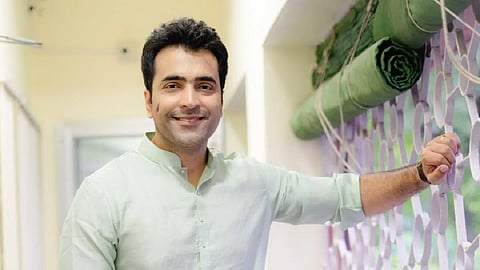

The Bengali community clapped with much gusto as he walked onto the stage to receive the ‘Best Actor’ award at the Telangana Bengali Film Festival (TBFF) - Aayna 2025. After all, Abir Chatterjee is one of the most important faces in Bengali cinema today and is widely known for his intense roles in movies such as Baishe Srabon, Guptodhoner Sondhane, Raktabeej, Fatafati, Alap, and most recently, Deep Fridge, which was screened at the festival. Abir exclusively spoke to CE about his journey, love for Hyderabad, and more.
Excerpts
Tell us about your film, Deep Fridge.
The film has been travelling to various film festivals, including the International Film Festival of India (IFFI) in Goa and Habitat Film Festival. Deep Fridge is a very deep, nuanced film; it’s not the type of movie that stays on the surface. I understand that films need to entertain, but this one will make you go back home and really introspect.
How did your journey in filmmaking begin?
Many of my family members were theatre artistes who then went to TV and the big screen. In fact, my parents would come to Ramoji Film City every two or three months because in the 1990s and early 2000s, several Bengali TV serials and films were shot here.
Though I acted in plays as a child artist, my family — like most middle class Bengali families at that point in time — saw that I completed my graduation. I chose to do an MBA after that and work, while simultaneously doing TV serials! The shift to films was only natural — well, I suppose acting runs in my blood.
I have received both love and hate for my roles; like in the TV serial Banhishikha, I played the role of the antagonist. As people watched one episode after the other, I think they started to hate me — so much so that one day, when I was walking on a street in Kolkata, two middle aged ladies came up to me and said, ‘How could you do this, how could you be so bad…’ I was taken aback — they saw me not as Abir but as the villain in that serial. (laughs)
What is your creative process?
Primarily observation — I believe that if an actor has to play a role well, he has to keenly observe those around him. And I ask my directors many, many questions because I’m terribly curious.
What advice do you have for youngsters aspiring to make it big in the industry?
Love your job and do it honestly. The name, fame, selfies, or whatever it may be, will follow. You cannot lie to a camera because it captures you as you are. If the camera loves you, then everybody will love you.
What sets Bengali cinema apart from other industries?
Well, great authors over the years gave us literature and stories that we are able to draw from to make films. Also, as a community, we Bengalis are rather emotional, so cinema is not only a medium of entertainment for us but also a medium of expression.
But what I like about the Tollywood industry is that they make larger-than-life films with conviction. They are honest and believe in what they make, and that shows.
What are your thoughts on Hyderabad?
Oh, it is a very vibrant city! People here are very much in touch with their Tollywood industry; they know which actor is involved in which project, what their previous role was, and so on. The industry connects well with the mass. Speaking of food, the haleem here is divine.
Which is better — Kolkata biryani or Hyderabadi biryani?
I cannot be diplomatic about biryani (laughs) — Kolkata it is!
Would you like to act in Telugu films?
Though I do worry about speaking the language correctly, I’d love to give it a try.